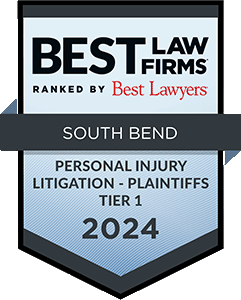 In most cases, there are no taxes owed on personal injury settlements as the Internal Revenue Service (IRS) does not consider this type of income to be a wage or salary. However, there are important exceptions.
In most cases, there are no taxes owed on personal injury settlements as the Internal Revenue Service (IRS) does not consider this type of income to be a wage or salary. However, there are important exceptions.
It is critical to know whether your personal injury settlement or award will be subject to taxes and how that can impact the total amount of compensation you receive. You also want to avoid having to pay any penalties on unreported taxable income.
The experienced South Bend personal injury lawyers at Pfeifer, Morgan & Stesiak can review the circumstances of your claim, discuss whether any portion of your recovery will be taxable and work to maximize the non-taxable parts of your claim.
Rule of Thumb
The general rule is that proceeds from a personal injury claim are not taxable under federal or state law. This rule applies to insurance proceeds, as well as to awards that are given by a judge or jury. The federal government will generally have access to your settlement information because the insurance company submits a 1099 claim to the IRS. The non-taxable rule only applies to physical injuries that result from car accidents and related expenses.
Non-Taxable Personal Injury Compensation: What is Included
If you receive compensation for the kinds of damages listed below, it is typically non-taxable:
- Medical bills
- Pain and suffering
- Loss of consortium
- Attorney fees
Medical expenses include bills to diagnose, cure, treat, mitigate or prevent a medical condition.
Exceptions for Non-Taxable Compensation
There are exceptions to when personal injury compensation is taxable. For example, if you include the medical expenses related to the injury for a tax deduction on your prior year’s tax return, the portion of your award that went to reimburse you for these expenses may be taxable. The IRS reasons that it is not fair for you to have received a tax deduction for medical expenses that were paid off by money from your settlement. Additionally, whether you receive wages from your employer or those wages are included as part of a settlement award, you are required to pay income taxes on that portion.
Many personal injury victims must pay their medical bills while they wait for a settlement. Sometimes it takes more than a year to settle a claim, so you might try to maximize your tax refund by itemizing these obligations, especially if other accident-related expenses have piled up. However, if you did not deduct these expense items previously, you do not have to include them on your taxable income.
If your damages are the result of a breach of contract, they will be taxable if the breach of contract is the basis of your lawsuit. Additionally, punitive damages and interest on a judgment are taxable.
Confusion Due to 2017 Law
In 2017, the Trump Administration signed a tax law that said compensation from a personal injury settlement or award is only tax-free if the injuries are physical. Emotional distress does not qualify as physical. Other by-products of emotional distress, such as insomnia, headaches and stomachaches also do not qualify to receive the tax-free treatment.
It can be confusing for people to differentiate between physical and other injuries. Generally, the way that it works is if you claim that the defendant caused you to be injured or become physically sick, and you receive compensation for damages based on this claim, then this compensation is tax-free.
However, if you claim that the damages were due to emotional distress, your award is taxable. If the emotional distress causes you to suffer some physical symptoms, the physical symptoms do not elevate your claim to tax-free status. However, if you are physically injured or ill and suffer emotional distress, then the emotional distress damages should be tax-free.
Contact a Knowledgeable Lawyer for Help
A knowledgeable attorney, like those at Pfeifer, Morgan & Stesiak, is well-versed in complex legal issues, such as taxes on injury settlements. We can work tirelessly on your behalf to maximize the non-taxable portion of your award.
Contact our office in South Bend for a free no-obligation review of your case. We work on a contingency basis, so there is never any fee for you unless we win a favorable compensation on your behalf.
You can either call us at (574) 444-0741 or fill out the Free Case Review form.











